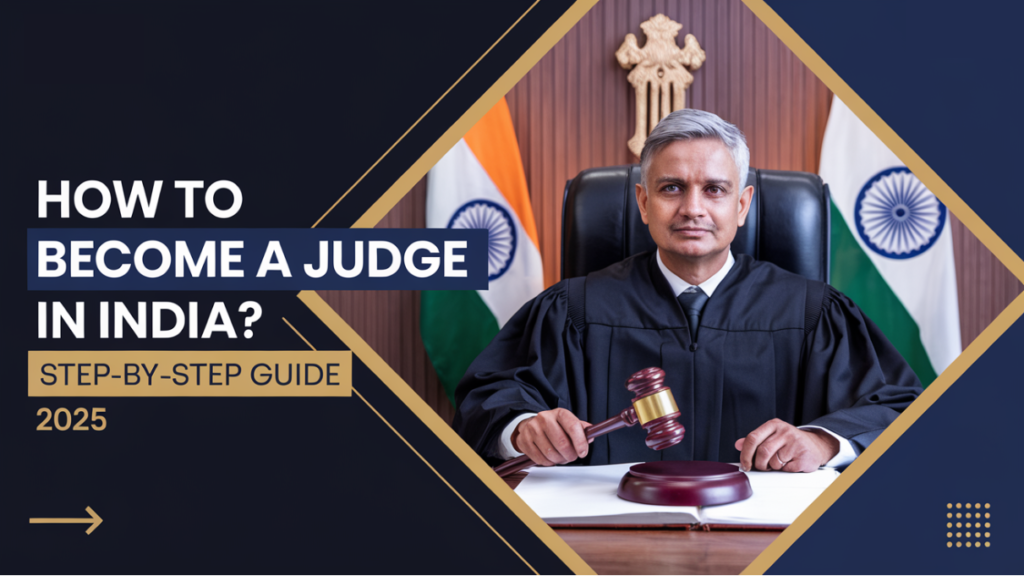How to Become a Judge in India? Step-by-Step Guide 2025
Becoming a judge in India is a prestigious career path for law aspirants. Judges are responsible for interpreting laws, ensuring fair trials, and upholding justice. This guide explains how to become a judge in India in simple, clear language. Whether you’re just beginning your academic journey or are already pursuing a legal career, this step-by-step guide will walk you through the eligibility criteria, necessary qualifications, exams, and career growth opportunities. Let’s explore what it takes to serve society by becoming a judge.
1. Who is a Judge?
A judge is a legal professional who presides over court proceedings, delivers verdicts, and ensures justice is served by applying legal principles. Judges work at various levels of the judiciary including District Courts, High Courts, and the Supreme Court of India. Their decisions can affect the lives of millions of people and shape the legal framework of the country.
Judges are expected to:
Interpret laws: They read and apply statutes, case laws, and legal precedents.
Conduct fair trials: They ensure that all parties receive a fair hearing.
Maintain order in the courtroom: Judges manage courtroom proceedings and make sure that the rules of evidence and procedure are followed.
Uphold the Constitution: They ensure that all judicial decisions align with constitutional principles and human rights.
2. Why Become a Judge in India?
Becoming a judge is not only a career choice but also a service to society. Here are some compelling reasons why many law aspirants choose this prestigious profession:
- Job Security: Judges hold a stable government position with lifetime tenure (subject to retirement age).
- High Respect and Authority: The judiciary is one of the most respected branches of the government.
- Service to Society: Judges play a crucial role in ensuring justice and protecting citizens’ rights.
- Attractive Salary and Perks: Along with a handsome salary, judges receive various benefits, including pensions, allowances, and other perks.
- Intellectual Challenge: The profession offers continuous learning, intellectual stimulation, and opportunities to solve complex legal issues.
- Impact on Society: Judges’ decisions help shape public policy and societal norms.
If you are passionate about the legal system and justice, becoming a judge allows you to make a significant contribution to society.
3. Educational and Professional Qualifications
To know how to become a judge in India, you must first meet certain educational and professional criteria. These vary depending on the level of judgeship you are targeting.
3.1 Basic Educational Qualification
- Law Degree (LLB):
An LLB from a university that is approved is necessary. You can pursue this degree in two ways:- 3-Year LLB: After completing any undergraduate degree.
- 5-Year Integrated Law Course: Directly after Class 12 (such as BA LLB, BBA LLB, or BCom LLB).
3.2 Entrance Examinations
- CLAT (Common Law Admission Test):
For admission to many National Law Universities (NLUs) offering LLB programs, you need to clear CLAT. Excelling in this exam will help you secure a spot in a reputed law school. - State Judiciary Exams:
After completing your law degree and gaining some legal experience, you will need to appear for the Judicial Services Examination (often referred to as PCS-J or State Judicial Exams) to get a position as a Civil Judge or Judicial Magistrate.
3.3 Professional Experience
- Legal Practice:
For higher judicial positions, it is often necessary to gain practical experience by working as an advocate. Most judges, especially those in District Courts and above, require several years of legal practice before their promotion. - Enrollment with the Bar Council of India:
After completing your LLB, you must enroll as an advocate with the Bar Council of India, which is essential for practicing law.
3.4 Age Limit and Citizenship
- Age Criteria:
Generally, the age limit for appearing in judicial exams ranges from 21 to 35 years. This can vary by state and specific judicial post. - Citizenship:
You must be an Indian citizen to hold a judicial position in India.
4. How to Become a Judge After Class 10 and 12
Many students ask how they can start their journey toward becoming a judge even before they complete their law degree. Here’s a roadmap starting from Class 10 and 12:
4.1 After Class 10:
- Choose the Right Stream:
In Class 11 and 12, you can choose any stream (Arts, Commerce, or Science), but if you are interested in law, subjects like Political Science, History, and Legal Studies can provide a good foundation. - Develop Communication and Analytical Skills:
Focus on improving your reading, writing, and analytical skills as they are essential for a legal career. - Extracurricular Activities:
Participate in debates, model United Nations (MUN), or other forums that enhance your public speaking and reasoning abilities.
4.2 After Class 12:
- Clear CLAT or Other Law Entrance Exams:
Prepare for the CLAT or similar law entrance exams to secure admission to a prestigious law college. - Enroll in a Law Degree Program:
Choose between a 5-year integrated law program or a 3-year LLB course after graduation. - Internships and Moot Courts:
Engage in internships and moot court competitions to gain practical experience and insight into the legal profession.
Starting early will provide you with a competitive edge and a strong foundation for your future legal career.
5. Step-by-Step Procedure to Become a Judge in India
Now that you know the educational and professional requirements, let’s break down the process into clear steps:
Step 1: Complete Your Law Degree (LLB)
- Choose a Law School:
Apply to a recognized law school by clearing entrance exams like CLAT. - Complete Your Degree:
Whether it’s a 3-year or 5-year program, focus on building a strong foundation in legal studies. - Internships:
Gain hands-on experience by interning at law firms, courts, or with legal professionals.
Step 2: Enroll as an Advocate
- Bar Council Registration:
After your LLB, register with the Bar Council of India. Which allows you to legally practice law. - Start Practicing:
Work as an advocate to gain real-world experience in litigation, legal research, and case handling.
Step 3: Appear for Judicial Services Examination
- Prepare for the Exam:
Study the syllabus for the State Judicial Services Examination, which includes both preliminary and main exams, followed by an interview. - Clear the Exam:
This exam is conducted by state governments to recruit Civil Judges and Judicial Magistrates. - Interview and Viva-Voce:
Demonstrate your legal knowledge, judgment, and ethical values in the interview process.
Step 4: Gain Experience as a Lawyer
- Practice for Several Years:
Many higher judicial posts require 7-10 years of legal experience. - Build Your Reputation:
Work diligently, build case experience, and develop a reputation for fairness and expertise.
Step 5: Apply for Higher Judicial Positions
- Promotion from Lower Courts:
With experience and proven competence, you can be promoted to higher judicial positions such as District Judge. - Appointments:
High Court judges and Supreme Court judges are appointed based on seniority, merit, and judicial performance. These appointments are made by the President of India after consultation with senior judicial members.
6. How to Become a High Court Judge
A High Court Judge holds one of the highest positions in the judiciary. Here’s how to progress to this level:
- Experience Requirement:
You must have at least 10 years of experience as an advocate or be promoted from the lower judiciary. - Appointment Process:
High Court judges are appointed by the President of India, usually in consultation with the Chief Justice of India and state government authorities. - Role and Responsibilities:
High Court judges hear appeals, interpret laws, and resolve complex legal issues. Their decisions impact not only individual cases but also the broader legal framework.
7. How to Become a Supreme Court Judge
Becoming a Supreme Court Judge is the pinnacle of a judicial career. The criteria include:
- Extensive Experience:
Generally, you need at least 5 years of experience as a High Court judge or 10 years as an advocate practicing in the Supreme Court. - Expertise and Reputation:
Exceptional legal expertise, integrity, and a strong track record of judicial decisions are required. - Appointment:
The President of India appoints Supreme Court judges after consultation with the Chief Justice of India and other senior members of the judiciary. - Role:
Supreme Court judges handle appeals on a national level and set precedents that guide the entire legal system.
8. Career Growth and Promotion for Judges
The judicial career in India follows a structured hierarchy. Here is an overview of the career progression:
Entry-Level: Civil Judge (Junior Division)
- Entry:
Selected through the Judicial Services Examination conducted by state governments. - Role:
Handle minor criminal and civil cases at the trial court level. - Promotion:
Based on performance and experience, one can be promoted to Senior Civil Judge.
Mid-Level: District Judge
- Eligibility:
Typically requires 7-10 years of experience either as an advocate or through promotion from lower judicial positions. - Role:
Handle more significant civil and criminal cases. Their decisions have a broader impact on local communities. - Promotion:
Continued excellent performance can lead to promotion to High Court judgeship.
Senior-Level: High Court Judge
- Eligibility:
Extensive experience, usually 10+ years in legal practice. - Role:
Preside over appeals and complex legal matters. Their judgments contribute to the development of law in India. - Appointment:
Appointed by the President, following recommendations from senior judiciary members.
Pinnacle: Supreme Court Judge
- Eligibility:
Minimum of 5 years as a High Court Judge or 10 years of distinguished legal practice. - Role:
Handle national-level appeals, set legal precedents, and safeguard the Constitution. - Appointment:
made by the Indian president after consulting with the country’s chief justice.
9. Salary and Perks of a Judge in India
Judicial positions offer not only the honor of serving justice but also attractive financial rewards. Here’s a rough estimate of the monthly salaries and perks:
| Judicial Position | Approximate Monthly Salary |
| Civil Judge (Junior Division) | ₹77,840 – ₹1,36,520 |
| District Judge | ₹1,44,840 – ₹2,24,100 |
| High Court Judge | ₹2,25,000 + allowances |
| Supreme Court Judge | ₹2,50,000 + allowances |
| Chief Justice of India | ₹2,80,000 + allowances |
Additionally, judges receive perks such as housing allowances, medical benefits, pension schemes, and other government benefits that make this a secure and rewarding career.
10. Challenges and Rewards of a Judicial Career
| Challenges: | Rewards: |
| High Responsibility: | Prestige and Respect: |
| Judges must make decisions that can affect many lives and ensure justice for all. | The judiciary is one of the most respected professions in India. |
| Pressure: | Job Security: |
| The need to uphold the law and manage public expectations can be stressful. | Judges have a stable career with lifetime tenure until the prescribed retirement age. |
| Long Working Hours: | Opportunity to Impact Society: |
| Handling complex cases may require extended hours of work. | Judges play a crucial role in shaping the legal system and protecting citizens’ rights. |
| Constant Learning: | Financial Stability: |
| The legal landscape evolves constantly, requiring continuous education and adaptation. | A competitive salary and government benefits ensure financial security. |
11. How to Prepar
Study Material:
- Textbooks and Case Law:
Focus on legal textbooks, landmark judgments, and current case laws. - Previous Years’ Papers:
Reviewing past exam questions can give you an idea of the exam pattern. - Coaching Institutes:
Many aspirants opt for coaching to improve their chances of success.
Preparation Tips:
- Time Management:
Create a study schedule that covers all topics, balancing work and revision. - Mock Tests:
Regular practice through mock tests can help you manage time during the exam. - Group Studies:
Discussing with peers can clarify doubts and strengthen your understanding. - Stay Updated:
Keep abreast of legal developments, amendments, and important judgments.
Exam Pattern:
- Preliminary Exam:
This objective-based test filters candidates. - Main Exam:
The main exam consists of descriptive questions that test your legal writing and analysis skills. - Viva-Voce/Interview:
Your overall legal knowledge, temperament, and ethical standards are assessed during the interview.
12. How to Become a Judge After LLB
For those who have completed their LLB, here is a streamlined process to transition into a judicial career:
- Enroll as an Advocate:
Register with the Bar Council of India and start practicing law. - Gain Practical Experience:
Work as an advocate for a few years to understand court procedures and legal documentation. - Appear for Judicial Services Exam:
Apply for the State Judicial Services Examination, which recruits Civil Judges. - Climb the Judicial Ladder:
After serving as a Civil Judge, work towards promotions to District Judge, High Court Judge, and eventually, Supreme Court Judge.
13. How to Become a Judge After CLAT
CLAT is an essential exam for gaining admission into top National Law Universities (NLUs) in India. Here’s how you can use your CLAT success as a stepping stone toward a judicial career:
- Secure Admission in a Reputed Law School:
Clear CLAT to join an NLU that offers a 5-year integrated law program. - Focus on Academic Excellence:
Achieve high marks and participate in moot courts and internships. - Plan for Judicial Services:
During or after your LLB, prepare for the Judicial Services Examination. - Gain Internships and Legal Exposure:
Intern with courts, law firms, or legal research organizations to build a strong profile.
14. Future Trends and Opportunities in the Judiciary
The legal landscape in India is constantly evolving. Here are some future trends and opportunities that can shape your career as a judge:
- Technology in the Courts:
Increasing use of digital evidence, virtual hearings, and online case management systems. - Judicial Reforms:
Ongoing efforts to streamline judicial processes, reduce case backlogs, and improve transparency. - Focus on Human Rights:
Greater emphasis on protecting fundamental rights and social justice issues. - Continuous Learning:
Judges are encouraged to participate in training programs and workshops to stay updated with new laws and technologies. - Opportunities for Specialization:
Areas such as cyber law, environmental law, and intellectual property are emerging fields that can enhance your expertise.
15. Frequently Asked Questions (FAQs)
Here are some frequently asked questions about How to Become a Judge in India:
Q1: What is the minimum qualification required to become a judge in India?
You must have an LLB degree from a recognized university and be enrolled with the Bar Council of India.
Q2: Can I become a judge directly after LLB?
Yes, by appearing and passing the State Judicial Services Examination, you can begin your judicial career as a Civil Judge.
Q3: Is it necessary to clear CLAT to pursue a judicial career?
While CLAT is essential for admission to top law schools, it is not directly required to become a judge; however, a strong law degree helps build your foundation.
Q4: How many years of experience are needed to become a District Judge?
Typically, 7-10 years of experience as an advocate or through promotion from lower courts is required.
Q5: Who appoints Supreme Court judges in India?
Supreme Court judges are appointed by the President of India, in consultation with the Chief Justice of India.
Q6: What are the key stages in the judicial career ladder?
The career progression includes starting as a Civil Judge, then being promoted to District Judge, High Court Judge, and finally, Supreme Court Judge.
Q7: What is the role of a High Court Judge?
A High Court Judge hears appeals, interprets laws, and deals with significant legal matters, contributing to the development of law in India.
Q8: How long does the process of becoming a judge take?
Depending on the level, it can take anywhere from 5 to 10 years after completing your law degree, with additional years of legal practice for higher posts.
Q9: What are the benefits of becoming a judge in India?
Judges enjoy job security, high respect, attractive salaries, government benefits, and the opportunity to make a meaningful impact on society.
Q10: What are some future trends in the judiciary?
Future trends include the increased use of technology in courts, judicial reforms for efficiency, and greater emphasis on protecting human rights.
16. Conclusion
Becoming a judge in India is a challenging yet immensely rewarding journey. With the right academic qualifications, practical legal experience, and successful performance in judicial services examinations, you can climb the judicial ladder—from Civil Judge to the prestigious Supreme Court Judge. This career not only offers a stable and respected position but also provides you with the unique opportunity to serve society and uphold justice.
If you are passionate about law and are determined to contribute to a fair legal system, start preparing early by focusing on your studies, excelling in entrance exams like CLAT, and gaining practical experience through internships and legal practice. Remember, every step you take brings you closer to your goal of becoming a judge in India.
By following this comprehensive guide and continuously working on your legal knowledge and skills, you can successfully achieve your dream. Your dedication and hard work can help you make a lasting impact on society by ensuring justice and fairness in the legal system.


